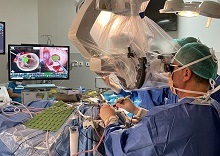 Rambam Healthcare Medical Center in Haifa, Israel is set to become the first medical centre in Israel to use virtual reality (VR) and augmented reality (AR) to plan and perform neurosurgeries—using technology provided by Surgical Theater. This extended reality (XR) platform will serve specialists at the departments of Neurosurgery and Paediatric Neurosurgery, allowing them to plan surgeries and navigate via 3D technology instead of relying on 2D computed tomography (CT) and magnetic resonance imaging (MRI) scans, according to a Surgical Theater press release.
Rambam Healthcare Medical Center in Haifa, Israel is set to become the first medical centre in Israel to use virtual reality (VR) and augmented reality (AR) to plan and perform neurosurgeries—using technology provided by Surgical Theater. This extended reality (XR) platform will serve specialists at the departments of Neurosurgery and Paediatric Neurosurgery, allowing them to plan surgeries and navigate via 3D technology instead of relying on 2D computed tomography (CT) and magnetic resonance imaging (MRI) scans, according to a Surgical Theater press release.
The Surgical Theater platform processes 2D imaging scans of the patient and builds a realistic 3D, 360-degree reconstruction, which, together with AR goggles, enables the surgeon to “fly” inside the brain of a patient, comprehending their anatomical structure in order to plan a surgical approach prior to surgery. Presurgical planning, especially during complex procedures, provides the surgeon with the ability to plan the most optimal approach, helping to prevent damage to critical clinical and vascular structures, the release adds.
“I am happy and proud that we are the first hospital in Israel to use VR and AR in performing neurosurgery,” said Gill Sviri, head of the Department of Neurosurgery at Rambam Medical Center. “Through this platform, we can plan access to the brain during surgery in a clear and tangible way, via a 3D, 360-degree view. This is in comparison to our ability today, using CT or MRI scans that only give us a 2D picture.
“The platform has simulator features that allow advanced planning of a surgical procedure. Additionally, the plan assists during surgery, and provides a 3D picture of the brain and the brain tumour during surgery—while simultaneously enabling AR visualisation through microscope lenses and navigation within the head of the patient.”
The same patient-specific model that is built during this surgical planning is also used in the operating room for enhanced visualisation, Surgical Theater states. The surgeon is able to superimpose, in real time, an AR overlay onto the live surgical site with the use of the StealthStation S8 (Medtronic), and a surgical microscope.
“The Surgical Theater platform will also assist young physicians who have not yet performed many surgeries, and will allow them to practice and plan surgeries at far greater efficiency through better understanding of brain anatomy,” Sviri added. “Learning through simulation is a very important component in training and practice for surgeons.”
Moni Benifla, head of the Department of Pediatric Neurosurgery at Rambam Medical Center, said: “Without a doubt, the Surgical Theater platform improves our understanding of each case, the anatomy of the patient, and the confidence and precision of the surgeon. This platform is expected to improve the efficiency of surgeries given that it presents the picture far more clearly in 360 degrees. I have no doubt that in the not-too-distant future, these platforms will become standard in every operating room, improving the chances of success—mainly with respect to complicated procedures, such as those in neurosurgery.”













